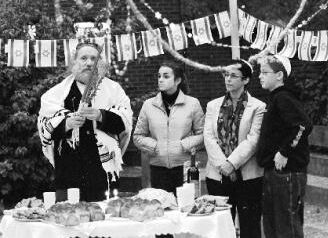Sukkoth — Festival of Thanks for Our Friends
Deister und Weser Zeitung, September 24, 2002
 Cantor Francois Lilienfeld celebrates Sukkoth. Looking on are Rachel Dohme with her children, Rebekka and Julian. Photo: Tac |
There was busy activity all day long on the property of the Jewish Congregation of Hameln in the Buerenstrasse. Pedestrians watched with interest as congregants began building the wooden booth. There was a fine blue net over the top, covered in branches and colorful leaves. Up until the last minutes before the service began, congregants decorated the booth with pictures, fruits,and Israeli flags. Rachel Dohme readied the Kiddush table with challah and wine. Christa Bruns, from the Society for Christians and Jews, carried chairs from her neighboring church. Everything was in place — Sukkoth could begin!
Sukkoth is the Hebrew name for the festival of booths, one of the three pilgrimage festivals in the Jewish calendar. The booths are a reminder of the booths in which the children of Israel lived as they wandered through the desert during Exodus. The Sukka must have 3 walls and a roof through which one can see the heavens.
In her opening words, congregation president Dohme said, “This Sukka is historic. For the first time in 64 years, a Sukka has been built by the Jewish congregation on this land — the land where, until its destruction in 1938, the Hameln synagogue stood.”
Rebekka Dohme sang the blessing and led the congregation in a song of welcome. Cantor Francois Lilienfeld led the service. During the service, the lulav (a palm branch and myrtle branches woven together with a special citrus fruit, an Etrog) was waved in all directions symbolizing God’s presence and protection.
After the service, Kiddush (wine, juice, and bread) was enjoyed by one and all — especially meaningful was a group of Moslem neighborhood children, who joined in. “It is a Mitzvah to invite neighbors and friends into the Sukka,” noted Ms. Dohme.
“Before the service began, I spoke with the dead” [members of the pre-war Hameln congregation whose names are listed on tablets in memorium at the site]. “I felt their souls with us this evening. This Sukka is in their memory.”